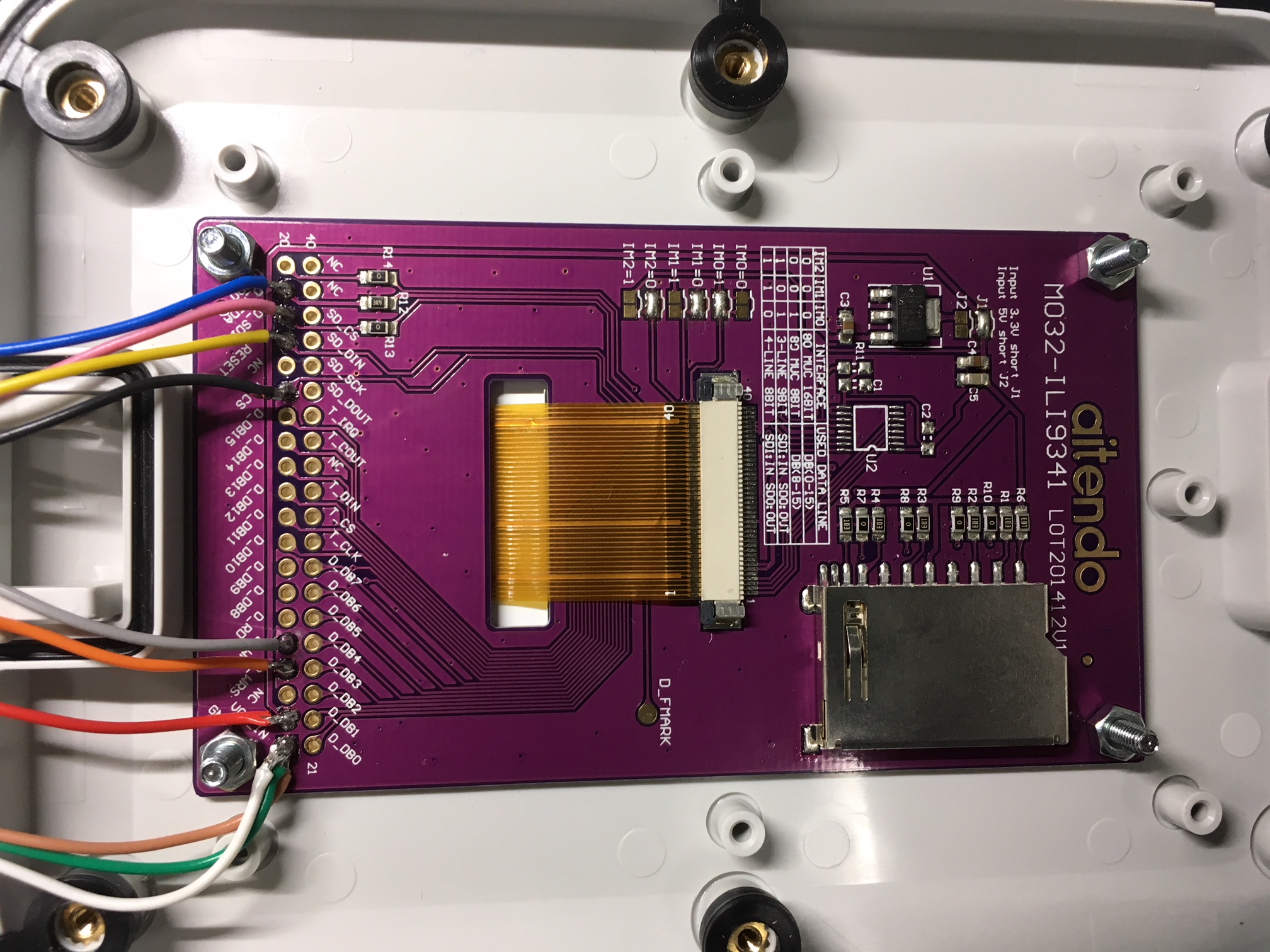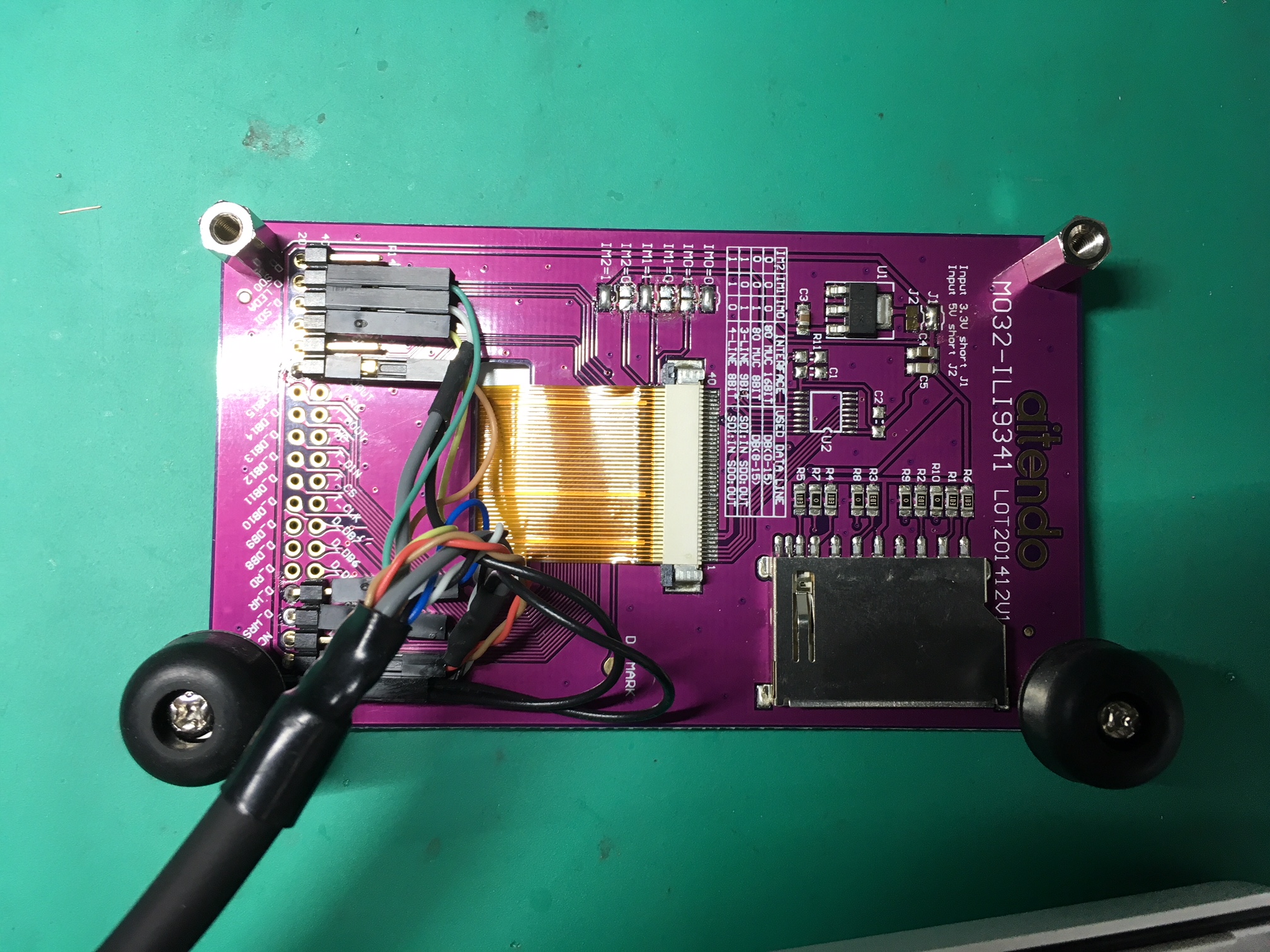Temporary Connector Reversed Version
Dependencies: UniGraphic mbed vt100
afero_poc15_180403R , J1 のピン配置を反転させたヴァージョンです。
Color2系を使用するためには以下のピンをジャンパで接続してください。
J1-D7 <-> J1-D0
J1-D6 <-> J1-D1
(調査中) また、こちらでテストした範囲では、
FRDM-KL25Z の V3.3 を、Modulo2 の VCC_3V3 ピンに接続してやる必要がありました。
尚、J1-D1, D0 を使用するために UART を無効にしているため
ログは表示されません。
TFTモジュールについて
aitendoのTFTモジュールはデフォルトでは8bit bus モードになっています。

半田のジャンパを変えて、SPIの設定にしてください。

サーミスタについて
POC1.5 では サーミスタは 25℃の時に抵抗値が 50.0kΩになる502AT-11 が
4.95kΩのプルアップ(実際は10kΩx2の並列)で使用されていました。
今回の試作では抵抗値が 10.0kΩの 103AT-11 が
5.1kΩのプルアップで使用されていますので、係数を合わせるために
SMTC502AT-11 のコンストラクタを
R0 = 10.0
R1 = 5.1
B = 3435
T0 = 298.15
で呼ぶように変更しました。
sensors/LM75B.cpp
- Committer:
- Rhyme
- Date:
- 2018-04-24
- Revision:
- 1:6c54dc8acf96
- Parent:
- 0:0b6732b53bf4
File content as of revision 1:6c54dc8acf96:
#include "mbed.h"
#include "LM75B.h"
#include "af_mgr.h"
/* Register list */
#define PTR_CONF 0x01
#define PTR_TEMP 0x00
#define PTR_TOS 0x03
#define PTR_THYST 0x02
/* Configuration register */
/* B[7:5] : Reserved */
/* B[4:3] : OS_F_QUE[1:0] OS fault queue value */
#define CONFIG_QUE_1 0x00
#define CONFIG_QUE_2 (0x01 << 3)
#define CONFIG_QUE_4 (0x10 << 3)
#define CONFIG_QUE_6 (0x11 << 3)
/* B[2] : OS_POL 0 = OS active LOW, 1 = OS active HIGH */
#define CONFIG_OS_POL_L 0x00
#define CONFIG_OS_POL_H (0x01 << 2)
/* B[1] : OS_COMP_INT 0 = OS comparator, 1 = OS interrupt */
#define CONFIG_OS_COMP 0x00
#define CONFIG_OS_INT (0x01 << 1)
/* B[0] : SHUTDOWN 0 = normal, 1 = shutdown */
#define CONFIG_NORMARL 0x00
#define CONFIG_SHUTDOWN 0x01
/* Temperature register */
/* D[15:5] = 11 bit data 0.125 * temp data */
/* D[4:0] : reserved */
/* Tos register */
/* D[15:7] = 9 bit data */
/* D[6:0] : reserved */
/* Thyst register */
/* D[15:7] = 9 ibt data */
/* D[6:0] : reserved */
LM75B::LM75B(I2C *i2c, int addr) : m_addr(addr<<1) {
p_i2c = i2c ;
p_i2c->frequency(100000); /* 100kHz */
// activate the peripheral
}
LM75B::~LM75B() { }
int LM75B::temp(int8_t *temp)
{
int result ;
char t[1] = { 0x00 } ;
result = p_i2c->write(m_addr, t, 1, true) ;
if (result == 0) {
result = p_i2c->read(m_addr, t, 1) ;
}
if (result == 0) {
*temp = (int8_t)t[0] ;
}
return( result ) ;
}
int LM75B::getTemp(float *temp)
{
int result ;
char t[2] = { 0, 0 } ;
int16_t iTemp = 0 ;
result = p_i2c->write(m_addr, t, 1) ; /* write pointer byte 0x00 */
if (result == 0) {
result = p_i2c->read(m_addr, t, 2) ; /* read MSB, LSB */
}
if (result == 0) {
iTemp = (t[0] << 8) | t[1] ;
iTemp >>= 5 ;
*temp = 0.125 * iTemp ;
}
return( result ) ;
}
int LM75B::getConfig(uint8_t ptr_byte, uint8_t *config_data)
{
int result ;
char config = 0x00 ; /* default value */
result = p_i2c->write(m_addr, (char*)(&ptr_byte), 1, true) ;
if (result == 0) {
result = p_i2c->read(m_addr, &config, 1) ;
}
if (result == 0) {
*config_data = config ;
}
return( result ) ;
}
int LM75B::setConfig(uint8_t ptr_byte, uint8_t config_data)
{
int result ;
char t[2] ;
t[0] = ptr_byte ;
t[1] = config_data ;
result = p_i2c->write(m_addr, t, 2, true) ;
return( result ) ;
}
int LM75B::readRegs(int addr, uint8_t * data, int len)
{
int result ;
char t[1] = {addr};
__disable_irq() ; // Disable Interrupts
result = p_i2c->write(m_addr, t, 1, true);
if (result == 0) {
result = p_i2c->read(m_addr, (char *)data, len);
}
__enable_irq() ; // Enable Interrupts
return( result ) ;
}
int LM75B::writeRegs(uint8_t * data, int len) {
int result ;
__disable_irq() ; // Disable Interrupts
result = p_i2c->write(m_addr, (char *)data, len);
__enable_irq() ; // Enable Interrupts
return( result ) ;
}
 La Suno
La Suno